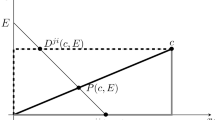Abstract
This article introduces and analyzes random conjugates of bankruptcy rules. A random conjugate is a rule which is derived from the definition of the underlying rule for two-claimant problems. For example, the random conjugate of the Aumann–Maschler rule yields an extension of concede-and-divide: the basic solution for bankruptcy problems with two claimants. Using the concept of random conjugates an alternative characterization of the proportional rule is provided. It turns out that the procedural definition of a random conjugate extends several of the properties of the underlying rule for two-claimant problems to the general domain of problems with an arbitrary number of claimants.
Article PDF
Similar content being viewed by others
Avoid common mistakes on your manuscript.
References
Aumann R, Maschler M (1985) Game theoretic analysis of a bankruptcy problem from the Talmud. J Econ Theory 36: 195–213
Chun Y (1988) The proportional solutions for rights problems. Math Soc Sci 15: 231–246
Curiel I, Maschler M, Tijs S (1988) Bankruptcy games. Zeitschrift für Operations Research 31: 143–159
Dagan N (1996) New characterizations of old bankruptcy rules. Soc Choice Welf 13: 51–59
Dagan N, Volij O (1997) Bilateral comparisons and consistent fair division rules in the context of bankruptcy problems. Int J Game Theory 26: 11–25
de Frutos M (1999) Coalitional manipulation in a bankruptcy problem. Rev Econ Des 4: 255–272
Dominguez D, Thomson W (2006) A new solution to the problem of adjudicating conflicting claims. Econ Theory 28: 283–307
Hokari T, Thomson W (2008) On properties of division rules lifted by bilateral consistency. J Math Econ 44: 1057–1071
Ju Y, Borm P, Ruys P (2004) The consensus value: a new solution concept for cooperative games. CentER DP 2004-50, Tilburg University, Tilburg, The Netherlands
Ju B-G, Miyagawa E, Sakai T (2007) Non-manipulable division rules in claim problems and generalizations. J Econ Theory 132: 1–26
Moulin H (2000) Priority rules and other assymetric rationing methods. Econometrica 68: 643–684
O’Neill B (1982) A problem of rights arbitration from the Talmud. Math Soc Sci 2: 345–371
Quant M, Borm P, Maaten R (2005) A concede-and-divide rule for bankruptcy problems. CentER DP 2005-20, Tilburg University, Tilburg, The Netherlands
Thomson W (2003) Axiomatic and game theoretic analysis of bankruptcy and taxation problems: a survey. Math Soc Sci 45: 249–297
Thomson W (2007) On the existence of consistent rules to adjucidate conflicting claims: a constructive geometric approach. Rev Econ Des 11: 225–251
Thomson W (2008) The two-agent claims-truncated proportional rule has no consistent extension: a constructive proof. Econ Lett 98: 59–65
Thomson W, Yeh C (2008) Operators for the adjudication of conflicting claims. J Econ Theory 143: 177–198
Acknowledgements
The authors thank William Thomson for helpful comments.
Open Access
This article is distributed under the terms of the Creative Commons Attribution Noncommercial License which permits any noncommercial use, distribution, and reproduction in any medium, provided the original author(s) and source are credited.
Author information
Authors and Affiliations
Corresponding author
Rights and permissions
Open Access This is an open access article distributed under the terms of the Creative Commons Attribution Noncommercial License (https://creativecommons.org/licenses/by-nc/2.0), which permits any noncommercial use, distribution, and reproduction in any medium, provided the original author(s) and source are credited.
About this article
Cite this article
Quant, M., Borm, P. Random conjugates of bankruptcy rules. Soc Choice Welf 36, 249–266 (2011). https://doi.org/10.1007/s00355-010-0474-5
Received:
Accepted:
Published:
Issue Date:
DOI: https://doi.org/10.1007/s00355-010-0474-5




